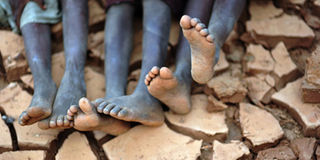2 million pastoralists in crisis as drought wipes out pastures

Photo/XINHUA
The cracked earth tells it all. Famine and severe drought in many parts of Kenya have affected pastoralist communities in the region.
About two million pastoralists are in crisis after pastures dwindled following severe drought in Kenya.
About 70 per cent of pastoralists in northern Kenya have moved to Ethiopia, Somalia, Isiolo, Kitui, Mwingi and Coastal lowlands in search of pasture in the last two months.
In an update on Kenya Food security, World Food Programme, United States Agency for International Aid and Famine Early Warning Systems Network say thousands of animals have died because they cannot walk long distances in search of pasture and water.
The report says pastoralists in Wajir, Mandera, Marsabit, Moyale, eastern Samburu and northern Isiolo have been worst hit with animal deaths rising to more than 15 per cent of the herds.
“Food insecurity has been accentuated in northeastern Turkana due to impacts of debilitating conflict and an extended absence of response agencies in the affected areas,” the report says.
It adds the next rains are expected in October and the situation could get out of hand if there are no urgent interventions. At the same time, the Italian government has flown in 40 tonnes of food.
Italian Deputy Foreign Minister Alfredo Mantica said this was one among several initiatives that his government was carrying out in response to famine in East Africa and the Horn Africa.
He said the relief food was expected to help feed more than 855,000 people for six months. The Italian official will flag off the relief food consignment to Dadaab at Jomo Kenyatta International Airport today Daadab.
A UN report titled ‘Kenya Humanitarian Situation Report’ carried out between July 13 and 22, 2011, indicate that failed rains had resulted in dwindling stocks from 2009 leading to people in North Eastern Province depleting their reserves.
The report says three consecutive seasons of failed rains was the reason famine had hit the country hard.
“Some parts of Kenya have faced two or three successive poor rain seasons, eroding gains made after the 2009/2010 El-Nino rains,” the report says.
The UN says that 2.4 million people are currently in need of relief food but the number could shoot up to 3.5 million by end of August.
As a result, UN’s central emergency rapid respond fund has released Sh1.25 billion to the government to contain the situation.
An additional Sh282 million was released to the government to specifically deal with refugees from Somalia.




